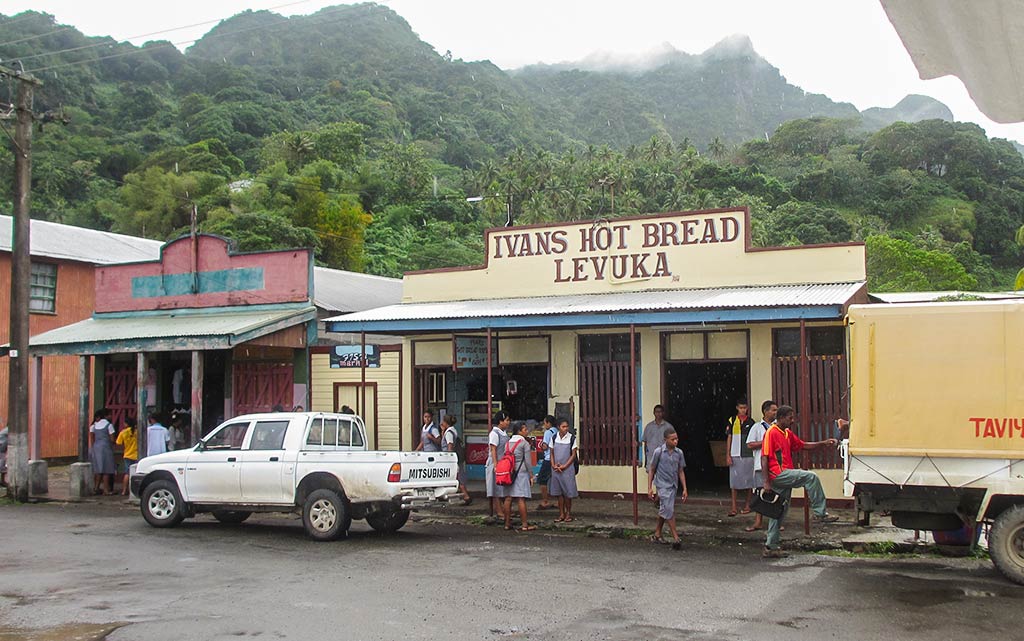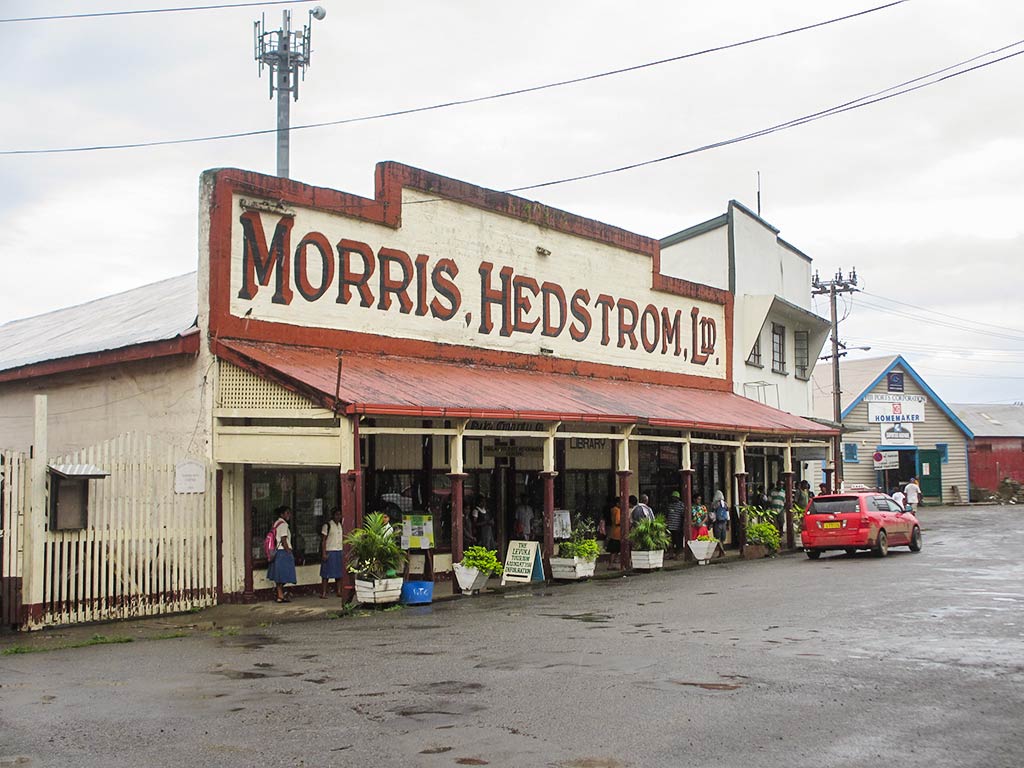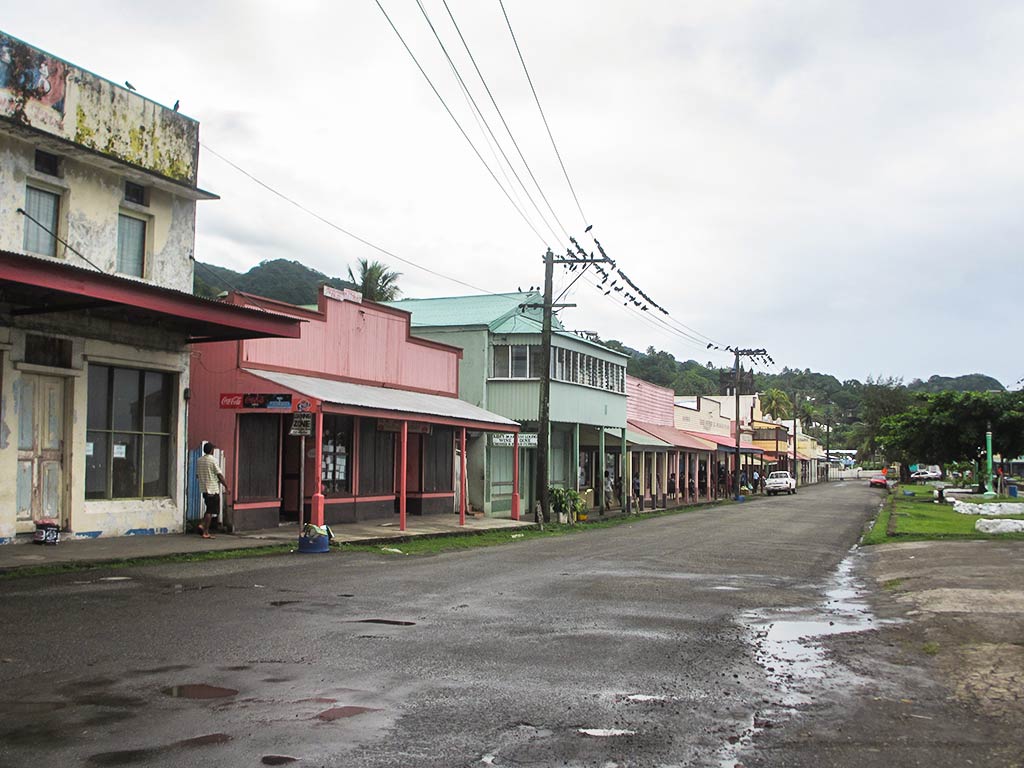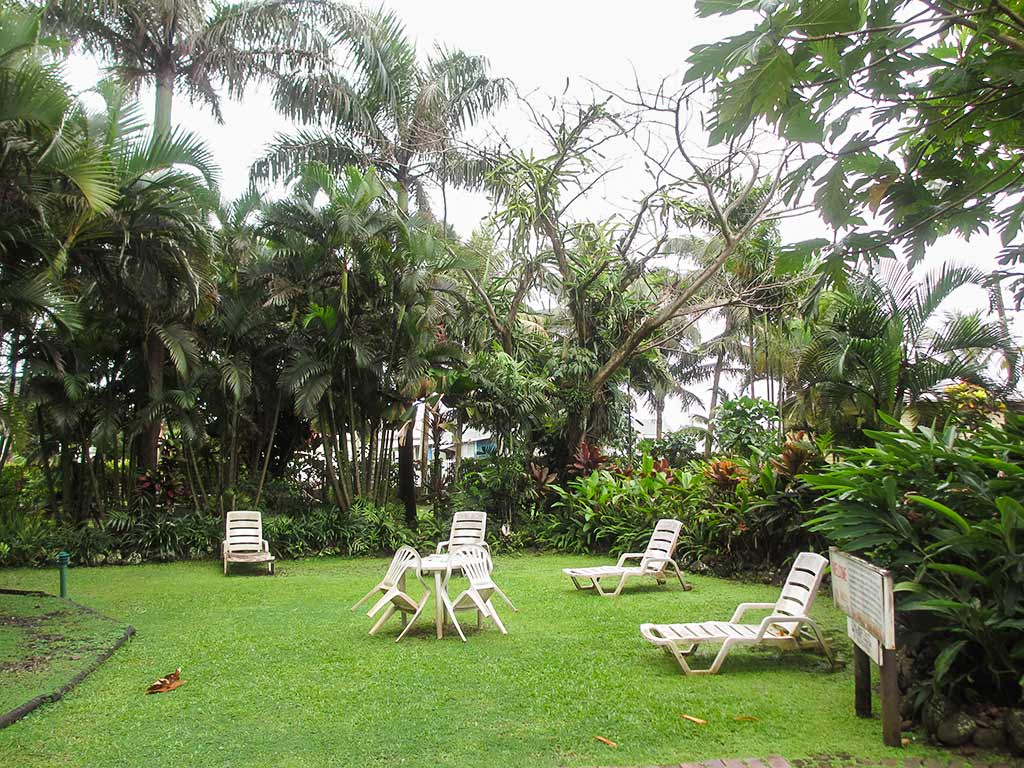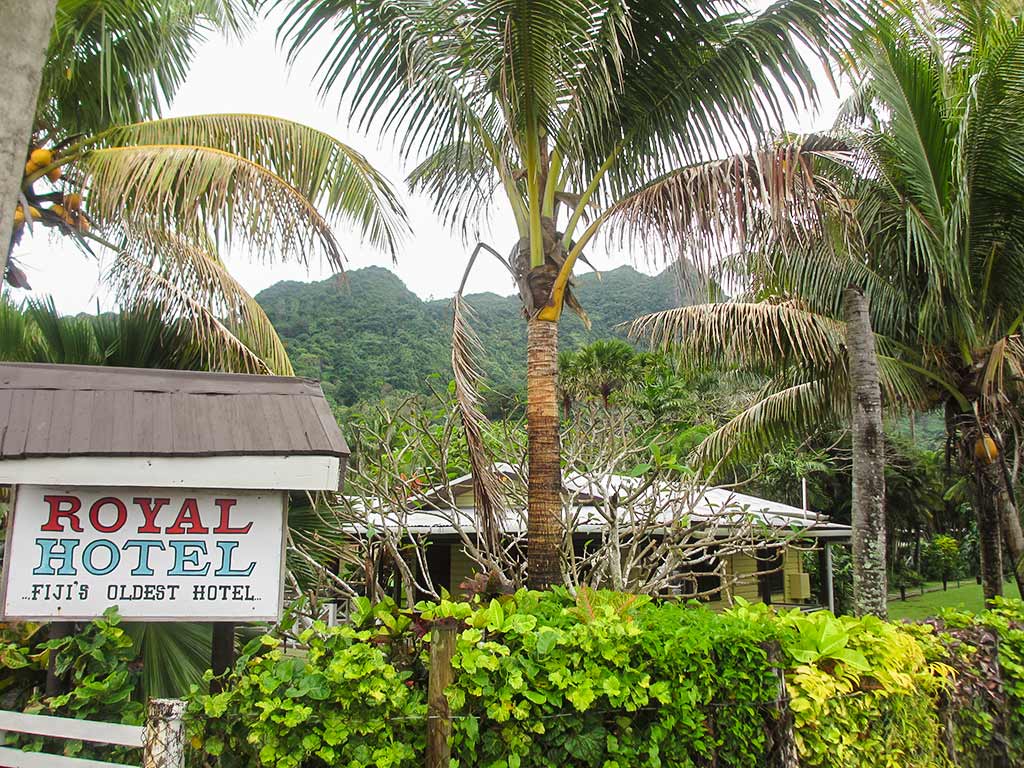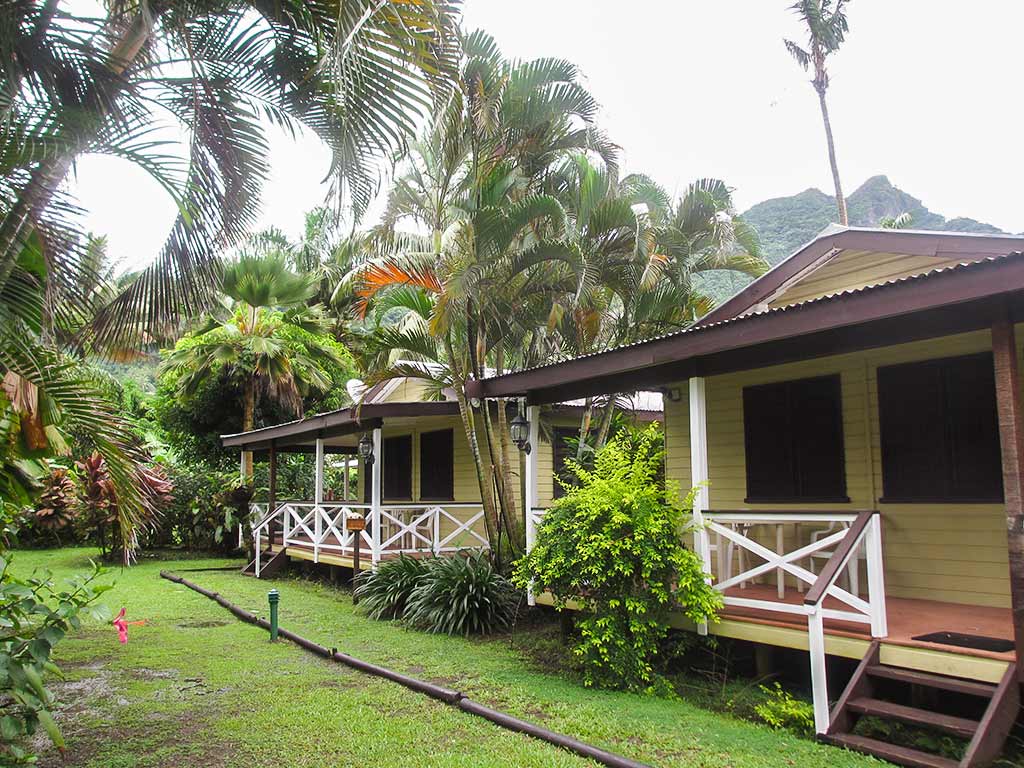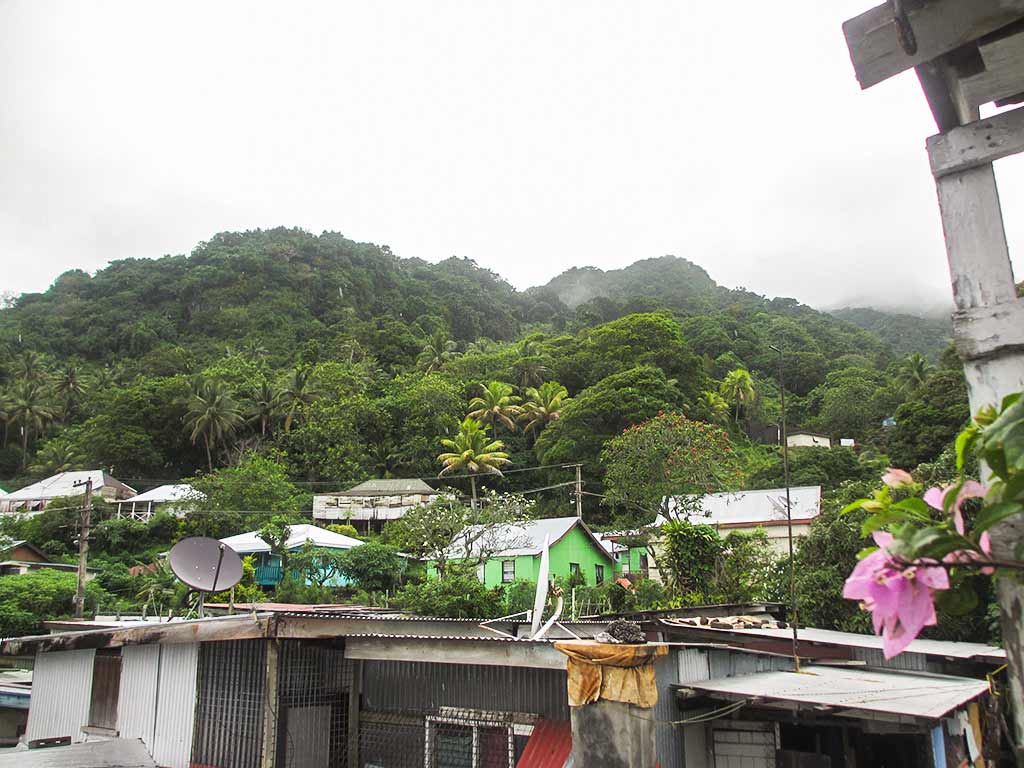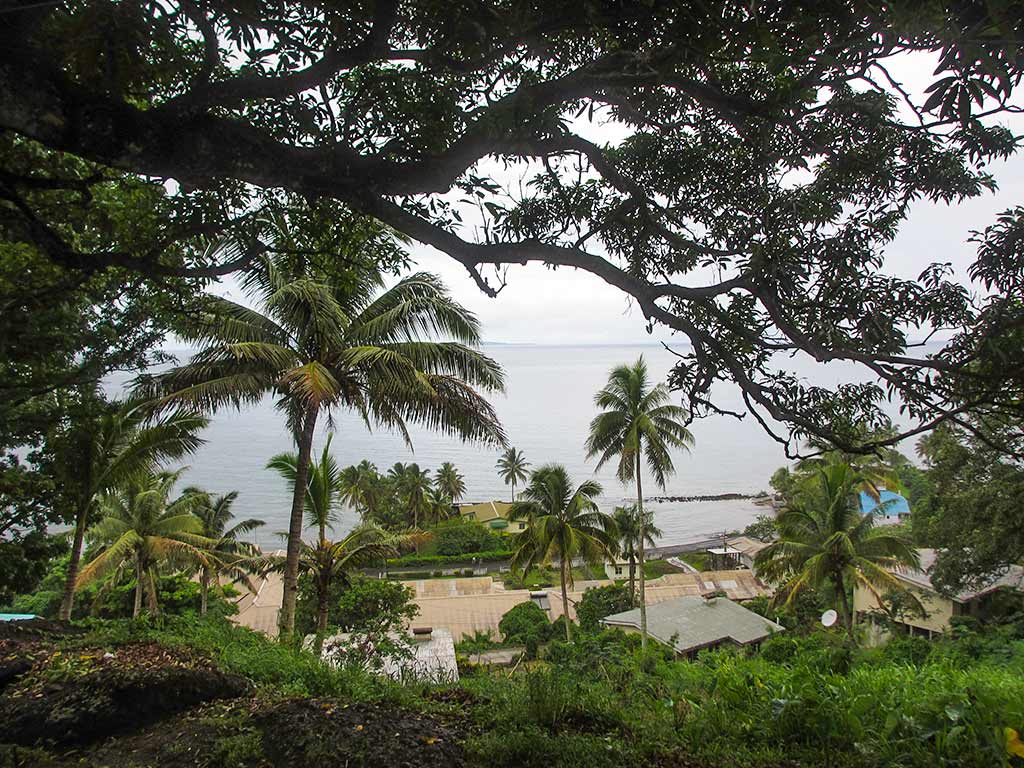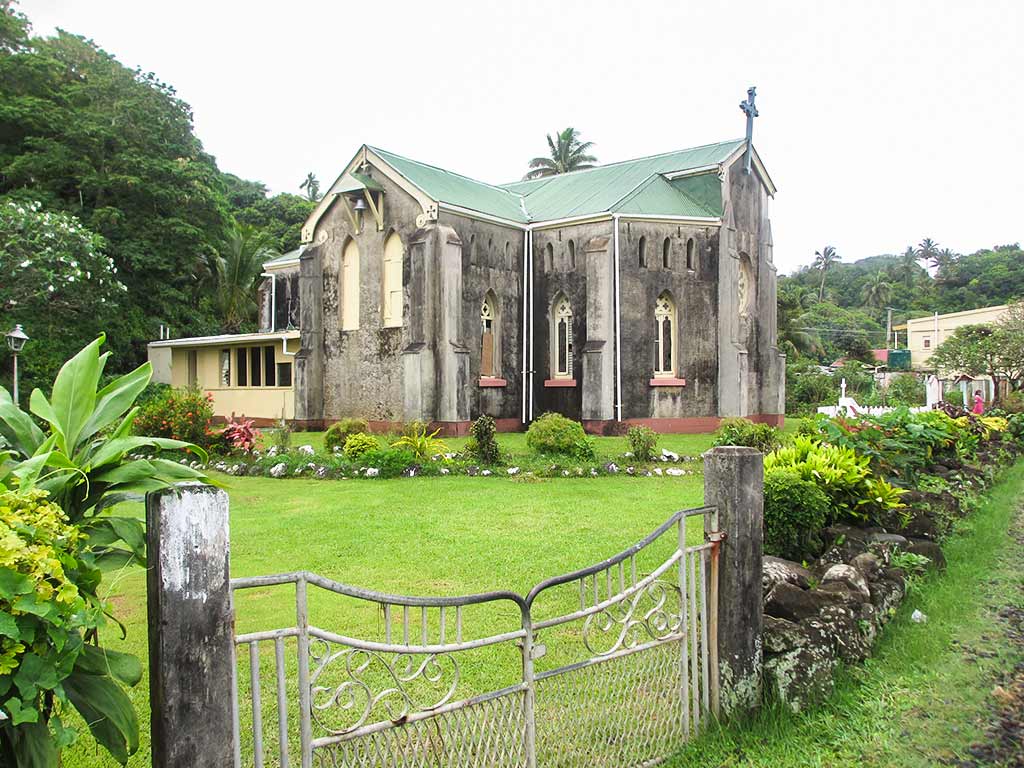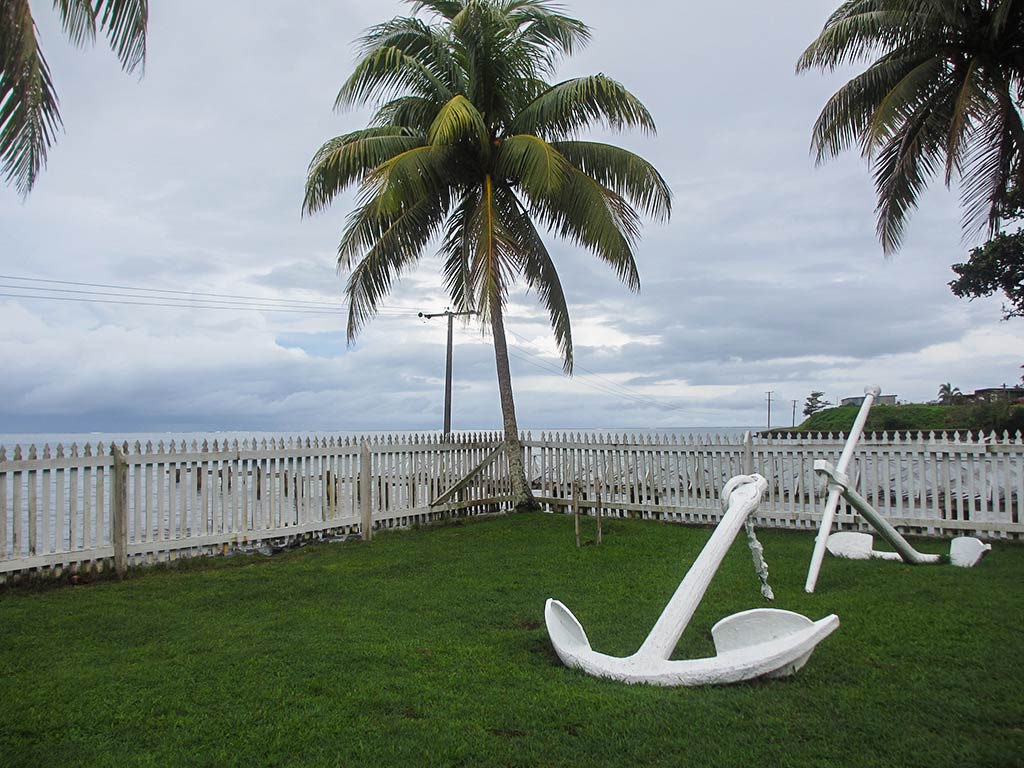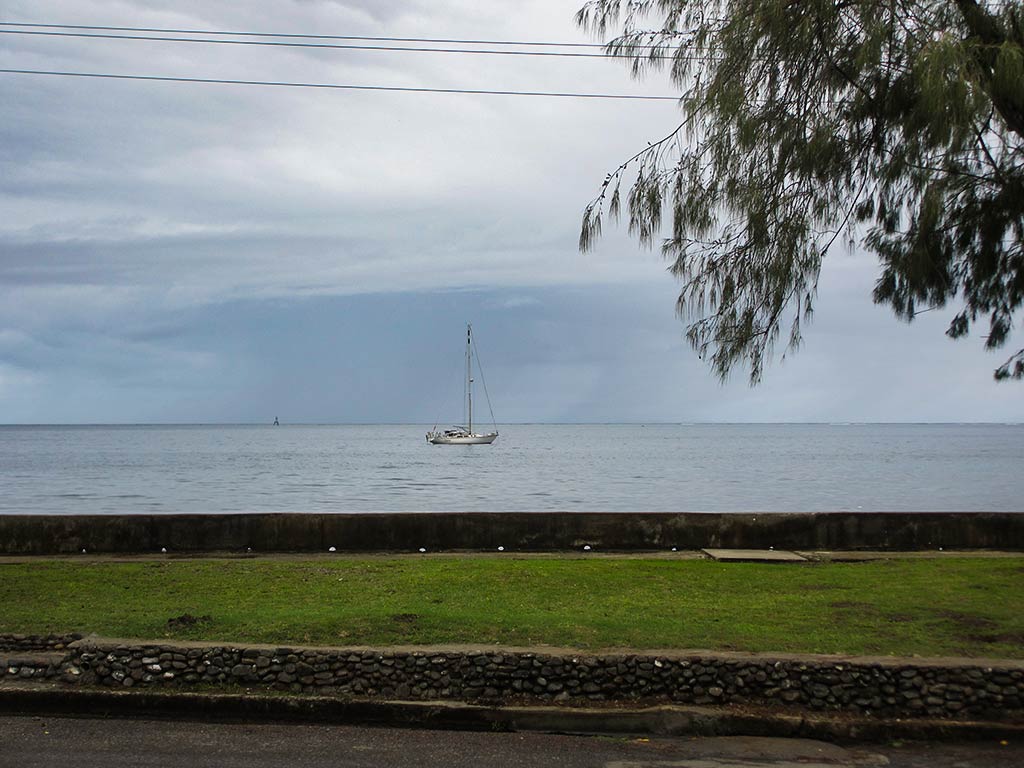October 31, 2013
Our first clue that this place might be less than idyllic happened after we anchored and turned off the engine. Instead of the expected quiet, we heard the drone of a loud generator coming from shore. Since we were going below to have a snack and cool off, this didn’t bother us.
Our trip ashore was then delayed by a drenching rain shower. We didn’t mind it–it’s always nice to get a rinse for a salty boat, but by the time it let up it was about 2:30 pm. From my guidebook it seemed there’d only be a couple of places still open for lunch, but at least we could still have lunch ashore. We tied our dinghy to a small boat dock at the wharf, making sure to check with the customs office that this was OK before heading off.
It was in town that we really started to feel some letdown. The sidewalk was rubbly, not maintained, and the street a bit too narrow considering all the cars going by. Flooded potholes littered the crowded sidewalk, making walking here a challenge. We tried crossing the street to walk along the waterfront, but it turned out to be drier under the overhangs of shops along the sidewalk.
The historic aspects of the town were interesting, but this place seemed to be in the decrepit stage of the aging process. There’s a point where cloudy and misty becomes dreary and gritty, and in this weather, Levuka had crossed over into the latter. Below, a few photos of Levuka (you can click to enlarge and scroll).
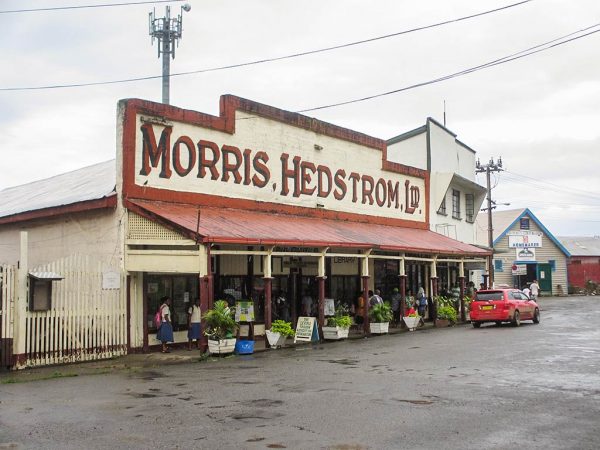
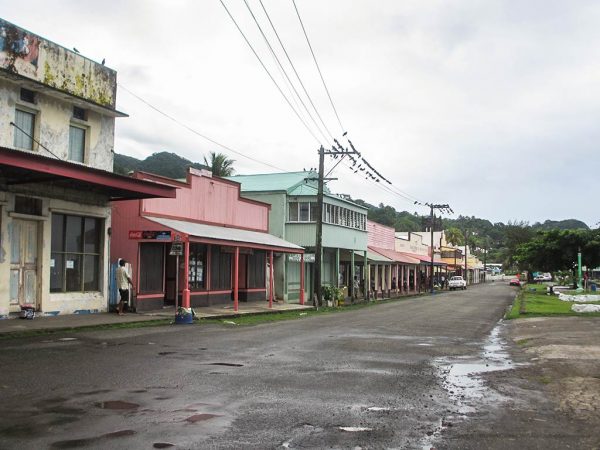
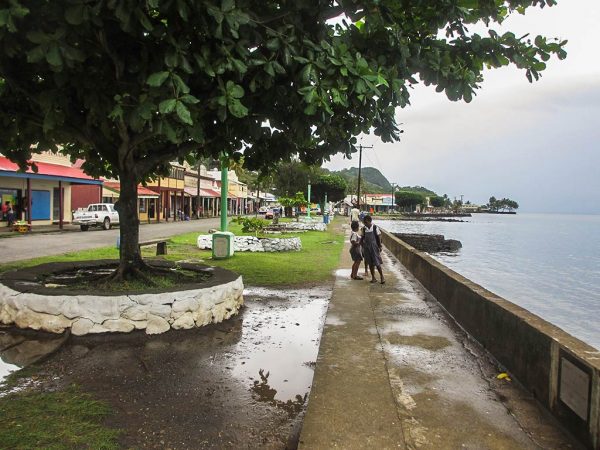
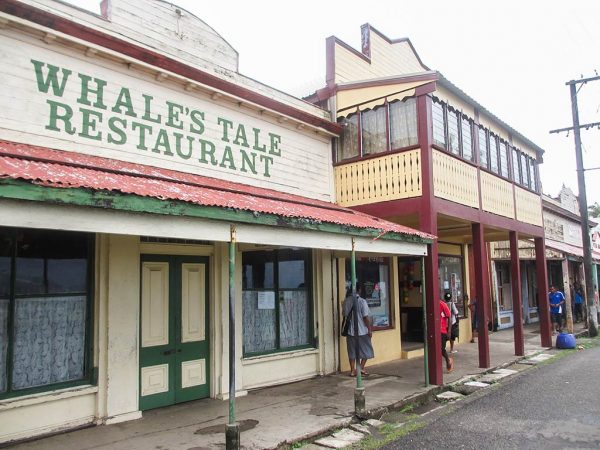
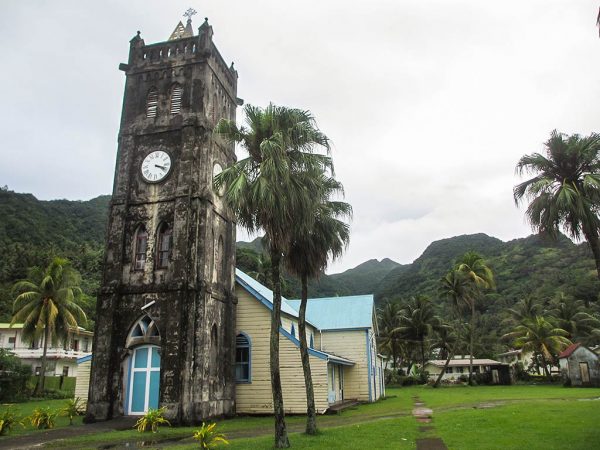
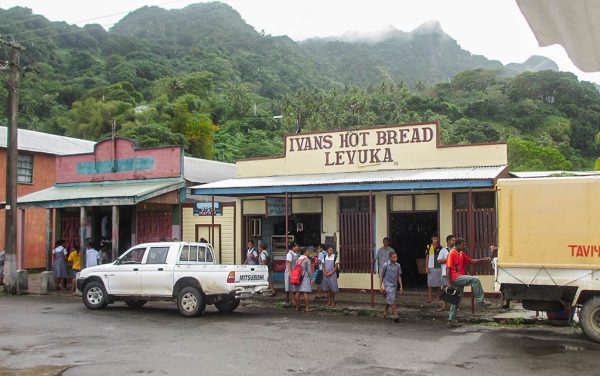
We made our way to the Whale’s Tale, the eatery that was supposed to be open but it was closed. My next lunch choice, the Sea View, was not a restaurant so much as a counter with three unappealing-looking food choices that had been sitting out way too long. Well, at least there was ice cream and, unable to understand what flavor the burnt-orange colored ice cream was, we opted for vanilla. We took our cones and walked on through the wet, muddy sidewalks past many (permanently) shut-down store fronts. This place was getting less appealing by the minute.
We stopped at the historic Royal Hotel which looked aged but intriguing. I was mostly anxious to see the pool I’d read about. We should have just followed the arrows even though a sign stated grounds were for guests only. Wanting to be honest and upfront, we went to the reception desk. We found a lady who was so low-energy it was hard to communicate with her. We asked about the pool and she said we could see it for $2. Well, I had wanted to see the pool so we reluctantly agreed.
The pool was pretty but not special—I’m not sure why my guidebook had made note of it. The lawn furniture was old and dirty and reminded me of my parents’ old stuff. This was not a place we’d ever stay, and it was hardly as welcoming as the guidebook said. We took pictures and wandered around to get our $2 worth; then left. I wondered if the writer who was so enamored of this place had recently discovered Vicodin. Below, a few photos of the pools and hotel.
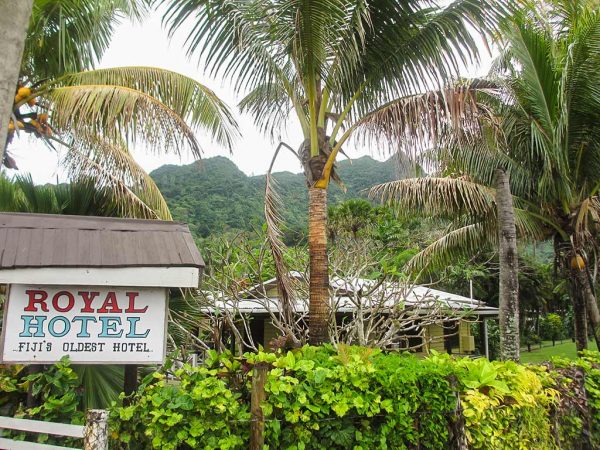
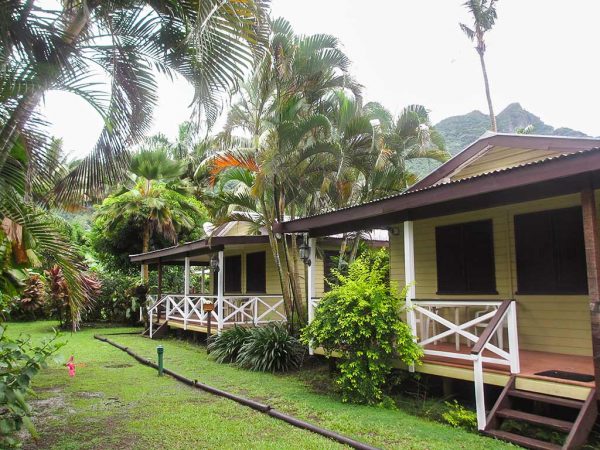
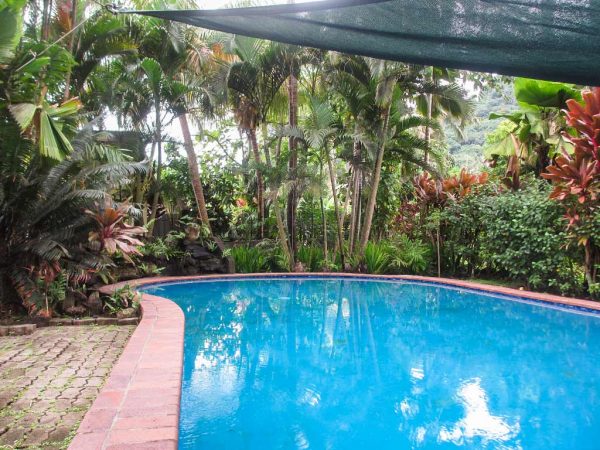
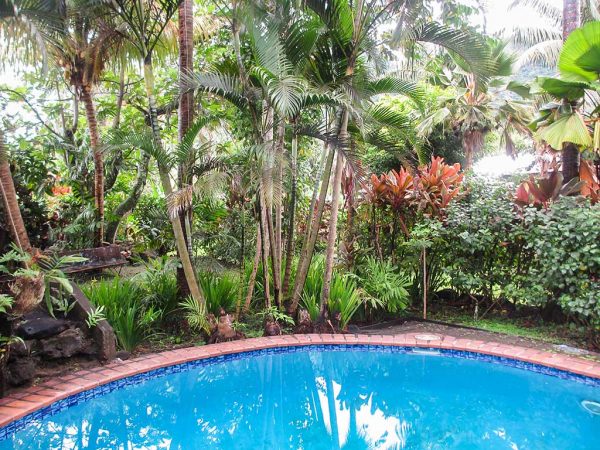
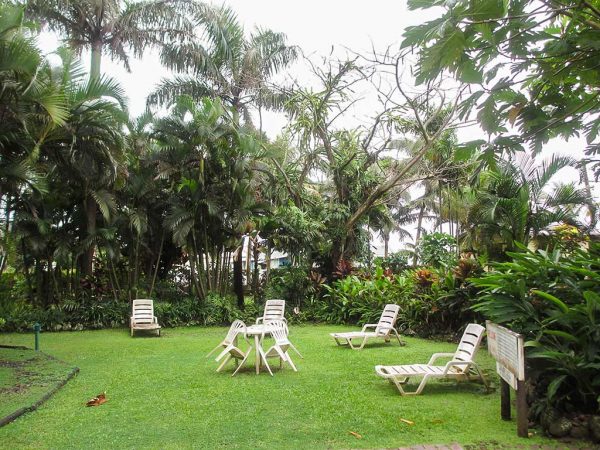
We continued on to the end of the town where the famous steps were. We walked up them and while they didn’t lead to any special views, it was a very pretty walk.
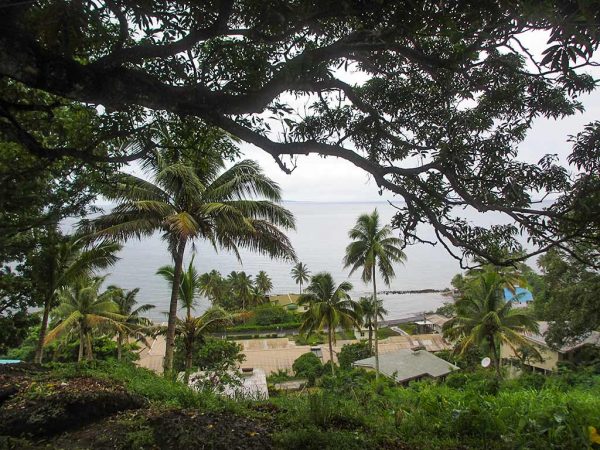
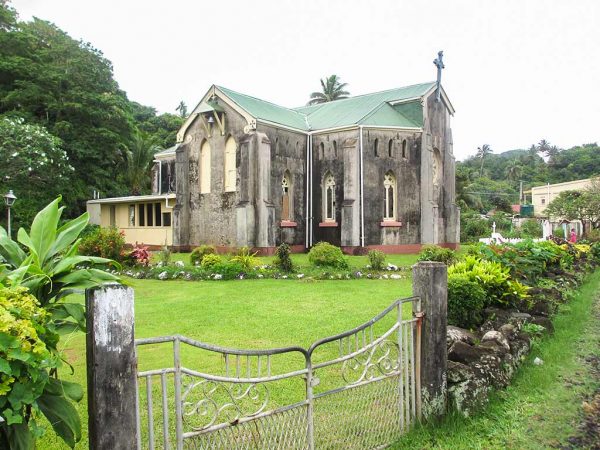
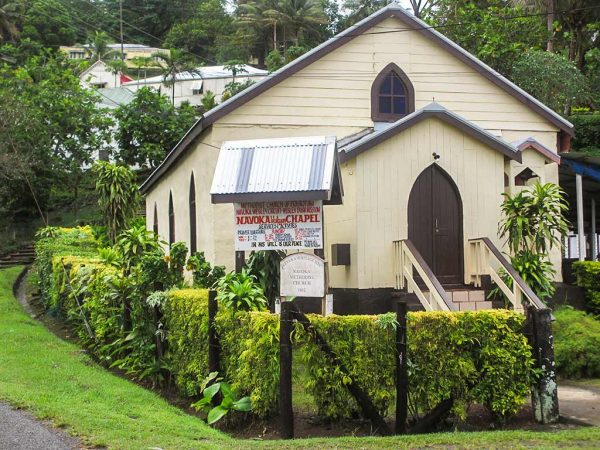
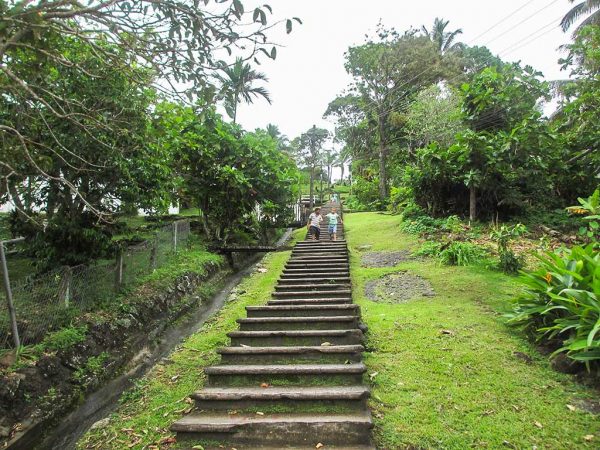
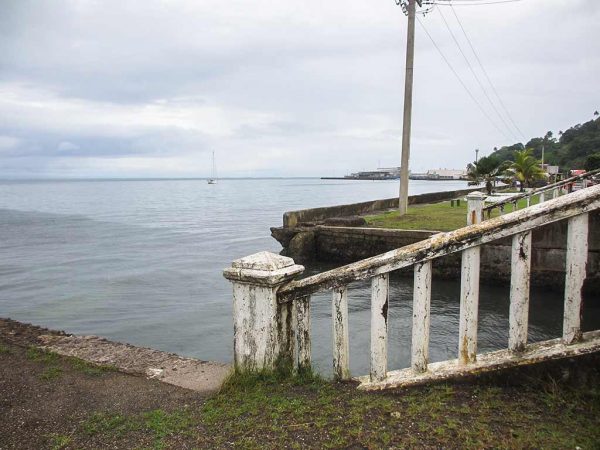
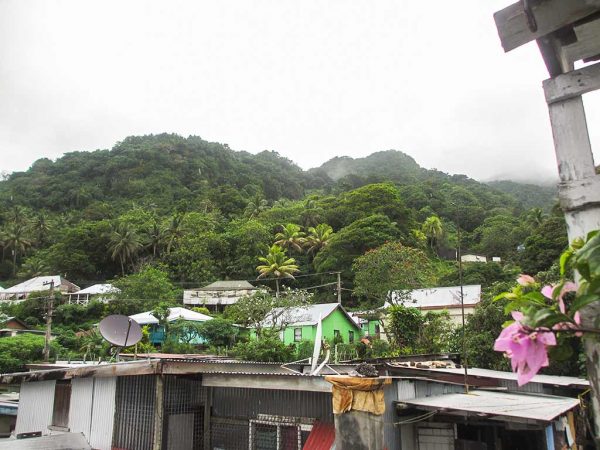
We went to see the old Methodist church, then headed back into town. I managed to get a look into an Asian restaurant I’d been interested in, closed until dinner but the door was open. It seemed to follow the theme of this town: old, run-down, and desperately in need of the refurbishment that could transform it from “ick” into a charmingly historic place. (The final possibility, a pizza place, was closed for the afternoon.)
We decided to see the rest of town, walking down past the tuna cannery through throngs of students, just out of school, and factory workers who’d just gotten off work for the day. We headed down to the Cession Monument guided by a couple of school kids who’d befriended us and had taken it upon themselves to show us the way. They were really sweet kids, and I was so happy to hear them talking about being on Facebook. This place might have been old, but it seemed the schools were modern enough that they embraced technology. (Below, a photo of Legacy from shore and the Cession Monument.)
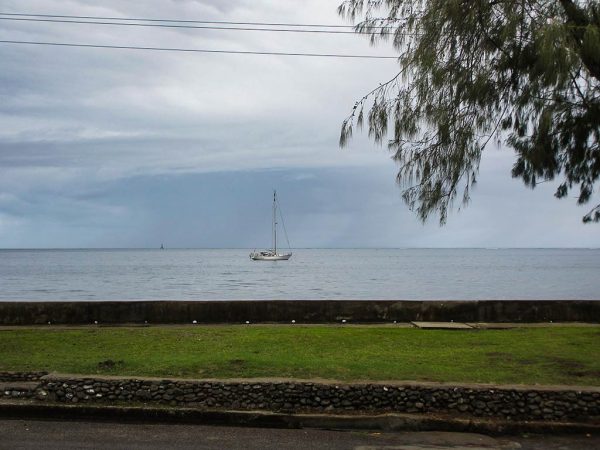
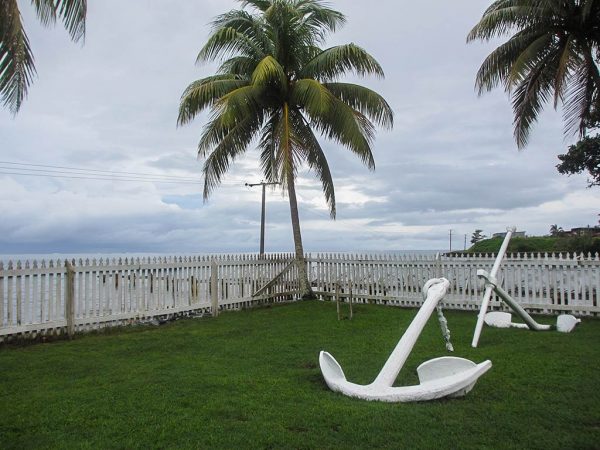
Personally, we believe everyone has a right to internet access and all that it brings; so we don’t feel that “the culture is being destroyed” worry that other cruisers have. Rich likes to joke that it wasn’t so many generations ago that my family was probably swinging from trees. Well, it was more than a few generations ago but whatever. My ancestors my have swung from tree limbs, but now I like the internet even if my own tree-jumping culture has been destroyed (although admittedly I do feel I missed out on having a tail). Seriously though, I’m Scottish and the sound of bagpipes echoes in my soul. But I find I can surf the internet while playing my bagpipe music while annoying my Hungarian-Polish husband all at the same time. My mighty bagpipe-playing ancestors probably made his gypsy-fiddle-campfire ancestors pee their pants in terror, which would explain his dislike of bagpipe music (after all, what’s not to like?). So there!
But back to the subject at hand: Levuka. Overall, we were disappointed in this place. It was unique and historic, but I had to ponder what made it so different from our beloved American Samoa. My theory was that American Samoa had an “umbrella” of money from America which kept it from going too far down a path of disrepair. Sadly Levuka had no such umbrella and was just too run down to have the charm it could and should have had. My hope was that someday, someway, this place would attract the creative base and money that could give it the sort of overhaul that has benefited so many places in the US and Mexico. This place could be special, but it wasn’t there yet.
Later, looking at Levuka from our boat, we had mixed feelings. Yes, we were disappointed in it, but this place still had something. We did decide to head on the next morning, feeling done with this, especially when the anchorage got a little rolly. Yet while I can’t say we liked it, we didn’t really dislike it, either. I hoped Levuka could attract the loving benefactors it so much needed. Tomorrow, we’d be moving on. –Cyndi






